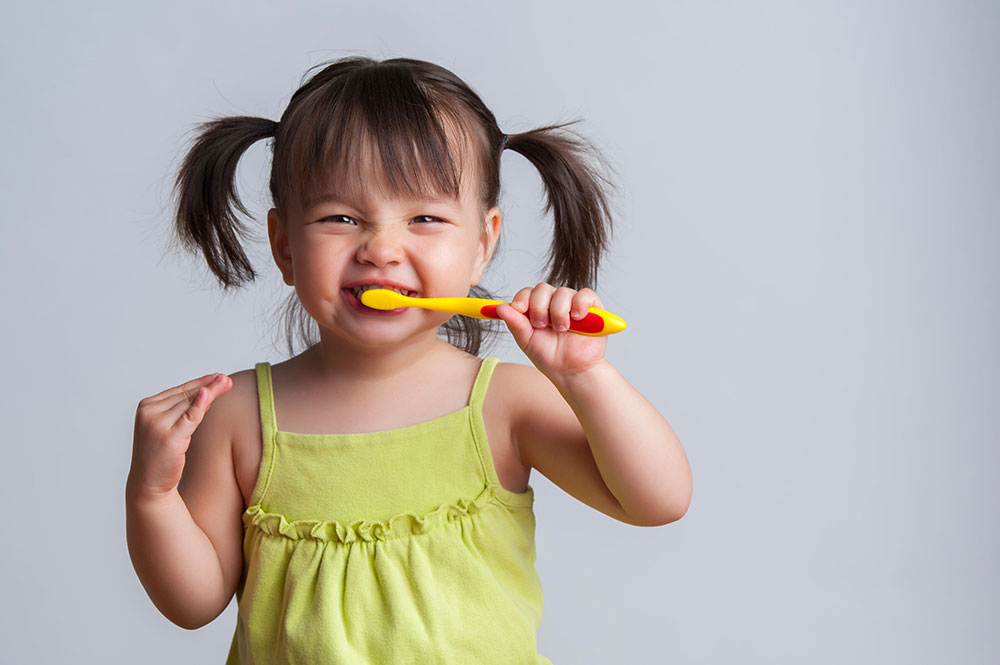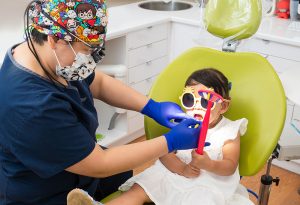EARLY CHILDHOOD CARIES
Did you know that as soon as your baby develops their first tooth, they are at risk of dental decay, which is known as Early Childhood Caries (ECC)? The following tips can help prevent ECC in your child: If your baby has teeth, it’s best to avoid settling them to sleep overnight with a breastfeed or bottle of milk, sweetened flavoured milk, cordial, soft drink or fruit juice. Bacteria feed on the sugar in these drinks and form plaque acids on teeth, which eat into the tooth surface and cause decay.
- Encourage your baby to learn to drink from a toddler cup from 12 months of age
- Don’t allow your child to take a bottle of milk or other sugary drinks to bed. When they are older, it is fine to place a glass of water on their bedside table in case they get thirsty overnight
- If your baby needs to suck on something to settle them to sleep, offer a dummy rather than a bottle
- If your baby has a breastfeed or bottle of milk before bed, gently wipe down their teeth with a moistened cloth before putting them to sleep
- Breast and bottle feeding regularly throughout the day or night once a child is over 12 months can contribute to ECC. Speak with your maternal and/or child health care adviser if your baby still needs an overnight feed
- Avoid giving your baby or toddler frequent snacks – three meals and two snacks per day is ideal to meet dietary needs
- If your baby suffers from a dry mouth (lack of saliva) and is a mouth breather, they are at greater risk of ECC. Speak with your maternal and/or child health care adviser or dentist if you think your baby may suffer from a dry mouth
- Good oral hygiene begins at birth. Click on the link below from the Australian Dental Association’s (ADA)website. This is a fact sheet on oral hygiene for babies and toddlers for guidelines on cleaning your baby’s gums and teeth
What is Teething?
For years many thought that teething caused fever and general sickness. Teething has been blamed for many things! Research into the problems of teething has shown that some children become irritable, have increased drooling and sometimes a facial rash. However, for most children the effect of teething is teeth! Teething is a normal part of development. If your child has a high temperature that worries you, it is unlikely to be caused by teething and you should consult your physician.
Many remedies have been suggested over the years. There are non medical things that can help. Teething rings have been found to be helpful for some babies. The biting pressure seems to relieve some discomfort especially if the teething ring is chilled. We generally do not recommend pain relief tablets. The treatment can be managed by local measures. For example, special local anaesthetic medicines are available to be placed on sore gum areas. Only use medicines intended for this purpose should be used.
Why are baby teeth so important?
Many parents have been led to believe that baby teeth don’t need to be restored if affected by decay. Yes, these teeth will eventually fall out. However, the average age for a child’s first primary tooth to fall out is 6-8 years of age and the last one between 11-13 years of age. If a primary tooth has been affected by decay and is not treated properly, it can result in subsequent damage to the developing adult tooth. Primary teeth play a vital role in your child’s growth and development. These teeth act as a guide for the permanent teeth to come into the mouth in the best possible position. If a tooth is prematurely lost before the permanent tooth is ready to come in, the nearby teeth can tip or move into the vacant space. When this happens, the permanent teeth may come in malpositioned.
How can I prevent decay caused by nursing?
Avoid nursing children to sleep or putting anything other than water in their bed-time bottle. Also, learn the proper way to brush and floss your child’s teeth. Take your child to a paediatric dentist regularly to have his/her teeth and gums checked. The first dental visit should be scheduled by your child’s first birthday.
When is the appropriate time to give up the bottle?
For those babies not being breast fed, there is general agreement that around one year of age is a good time to wean baby from the bottle. Paediatric dentists like to see children give up bottles as soon as possible. That is because they see an alarming number of toddlers with Nursing Bottle Decay. This type of decay, which begins on the front teeth, is only seen in toddlers. It results from prolonged use of a milk or sweetened liquid bottle that is put into bed with the baby.
Weaning from the bottle can be a difficult process. Speak to your paediatric dentist on strategies to help with this.
How can I stop my child’s thumbsucking or dummy habit?
Sucking is normal for babies and young children. Thumb sucking habits are usually established by three months of age. Some children have the need to ‘suckle’ more than others. Frequent use of a pacifier or thumb can create a number of problems such as an anterior open bite (front teeth do not meet), palatal (upper jaw) changes and tongue protrusive posturing (tongue thrusting). Although these conditions can be corrected through orthodontics and/or surgical procedures in the future, early intervention is recommended. Pacifiers should be discontinued by 2-3 years of age. If your child has a thumb sucking habit, begin to encourage discontinuation at 4-6 years of age. Your paediatric dentist will work with you and your child to develop a positive reinforcement reward system to help them quit.
What is the best way to clean a baby’s mouth?
Different methods have been recommended. The popular technique nowadays is to use a clean, small gauze pad. If non-sterile ones are purchased they are much less expensive. Alternately, a clean moist/wet wash cloth can be used. The teeth and gums are firmly wiped to remove liquid and food debris. This is done before bedtime. Once the child has back teeth, a small, soft toothbrush can be used to clean the grooves on the chewing surfaces of the molars. Your paediatric dentist will be able to work with you and your child to provide individualised advice
When should I start brushing my child’s teeth?
As soon as your child’s first tooth appears, begin using a soft-bristled toothbrush once in the morning after breakfast, before naps and most importantly at night before your child goes to bed. Use only a smear of toothpaste starting at 18 months of age, a pea-sized amount is sufficient and will not be harmful if swallowed. Do not be discouraged if your child refuses or becomes fussy during the brushing of his/her teeth. Children do very well with routines. As this is done on a ‘routine’ basis your child will become desensitized to brushing. If your child doesn’t seem to like the taste of toothpaste, just use water.
The simple answer is that teeth should be cleaned as soon as they first appear. Parents should not limit the cleaning only to teeth. The gums also need to be cleaned.
When does the first tooth come in?
The first tooth usually comes in around 6 months of age. Most often it is a lower front tooth. Our experience, however, is that the tooth eruption timing of primary teeth is more variable than for permanent teeth. The front 8 teeth (4 on top and 4 on bottom) usually have come in by 9 months of age. If you are concerned about your child’s dental development, speak to your paediatric dentist
When should I bring my child for his/her first dental visit?
Early examination procedures have been recommended strongly in the past decade to help reduce the number of infants and children who suffer from preventable tooth decay.
Ideally we like to see children have their first dental check up by their first birthday. Why? Seeing the child early gives the dentist the opportunity to examine the mouth and confirm normal oral development. Most importantly, the teeth can be examined for cleanliness. It gives the dentist the opportunity to provide advice on prevention and make the best care plan for your child. It also gives parents the chance to discuss feeding practices, teething and mouth habits.
DENTAL EROSION (ACID WEAR)
Erosion is the loss of tooth enamel caused by acid attack. Enamel is the hard, protective coating of the tooth, which protects the sensitive dentine underneath. When the enamel is worn away, the dentine underneath is exposed, which may lead to pain and sensitivity.
What causes dental erosion?
Every time you eat or drink anything acidic, the enamel on your teeth becomes softer for a short while, and loses some of its mineral content. Your saliva will slowly cancel out this acidity in your mouth and get it back to its natural balance. However, if this acid attack happens too often, your mouth does not have a chance to repair itself and tiny bits of enamel can be brushed away. Over time, you start to lose the surface of your teeth.
Are there any medical problems which can cause dental erosion?
People suffering from hiatus hernia or oesophageal problems, may also find they suffer from dental erosion due to vomiting. Medical conditions associated with chronic vomitting or acid reflux from the stomach can be associated with dental erosion. Speak to your dentist if you think you might be at risk of acid erosion. Together with your medical GP, your dentist can help reduce the acid wear on your teeth.
FISSURE SEALANTS
Fissure sealants are hard protective coatings that are applied in order to cover and protect the deep grooves (fissures) in our teeth and prevent dental decay. These fissures are most commonly located at the chewing surfaces on back teeth (molars and premolars). The grooves are at high risk for decay as they can be deep and narrow and collect plaque bacteria and food that cannot be accessed by toothbrush bristles. Plaque bacteria trapped in the fissures produce acids that can go on to cause decay at these prime sites. When these grooves are sealed, the risk for dental decay can be markedly decreased, especially in children’s teeth. According to the Australian Dental Association, a fissure is five times more likely to develop decay than any other tooth surface. Also, on a tooth surface with completely sealed fissures, protection is 100%. With wear over time, even after five years, a sealed tooth still has half the risk of an unsealed tooth. It is common to treat only those teeth that are identified to have a high risk for decay, but your dentist might recommend that you have all premolar and molar teeth sealed as a precaution. The first permanent molar teeth erupt into the mouth when a child is around 6 years old. The permanent teeth are important as they have a role to play throughout adult life. The best time to apply fissure sealants is immediately after the permanent teeth appear, as this is when they are most susceptible to decay – and children do not develop the manual dexterity to brush their own teeth effectively until they are of 8 to10 years old. Furthermore, permanent teeth continue to erupt right up until the age of 11 to 14. Hence, fissure sealants are a good preventative measure to lower the risk for dental decay in children’s teeth. Many studies have shown that fissure sealants are an effective way to lower risks for dental decay if combined with regular dental checkups and a good oral hygiene routine and diet.
CLEANING & FLUORIDE
Fluoridated water has the right amount of fluoride to help prevent caries when combined with fluoride toothpaste at the appropriate concentration for the age of the child. Bottled water has variable amounts of fluoride and many have zero fluoride. Boiling of water does not remove fluoride. The majority of water filters do not remove fluoride from water but reverse osmosis water filters have the ability to remove fluoride from water. This advice must be given on an individual basis by an informed oral health professional as each situation will display local variations.
LEARNING TO FLOSS
Kids can floss too! A good time to start flossing is when 2 of your child’s teeth begin to touch. In general, this might be around the age of 2-3 years old when all the teeth erupt. Flossing helps remove decay causing bacteria from between their teeth and keeps their gums healthy. It will take time for your child to get used to having their teeth flossed, however, ideally their teeth should be flossed twice a week in areas where the teeth are touching. Slide the floss between your child’s teeth and gently work it up and down, against the surfaces of each tooth. Do not snap the floss down between the teeth as the floss may hurt their gums. After flossing, have your child rinse with water, then brush (or if you prefer, brush then floss) your child’s teeth. If you find flossing your child’s teeth difficult, ask your dentist to show you how to do it. Floss holders are available, which can make flossing easier for some children.



